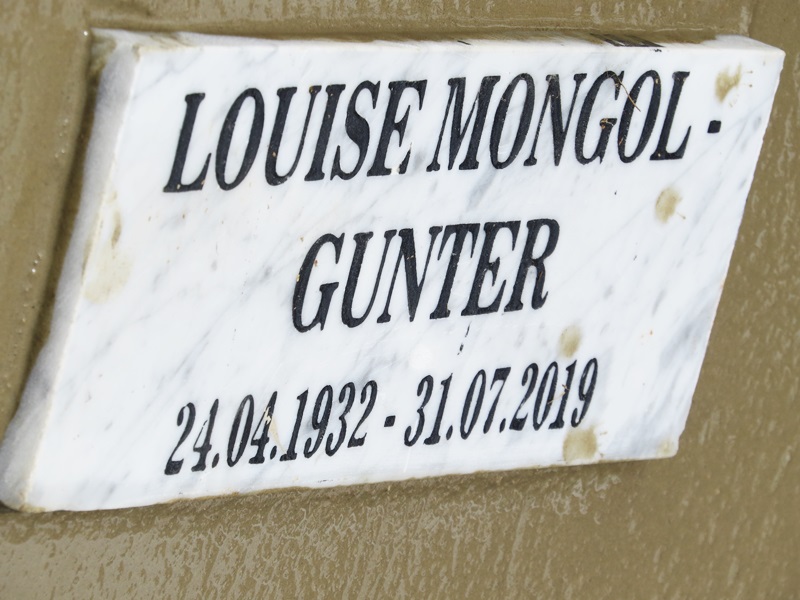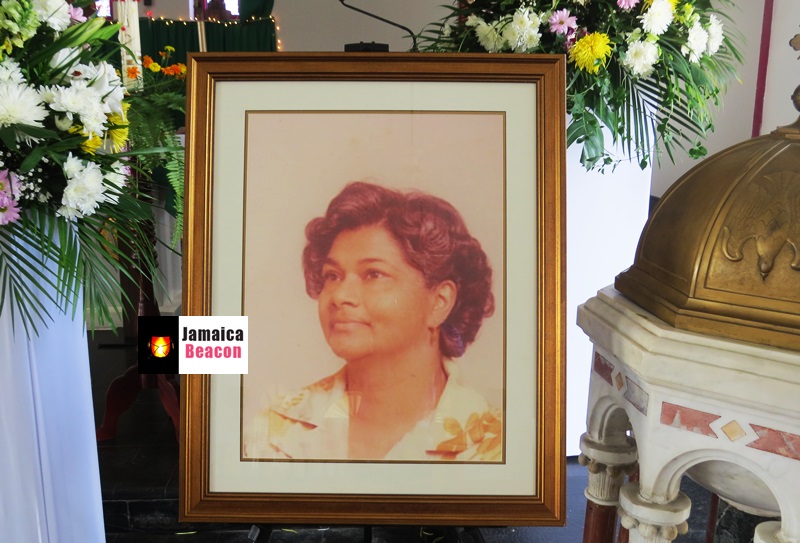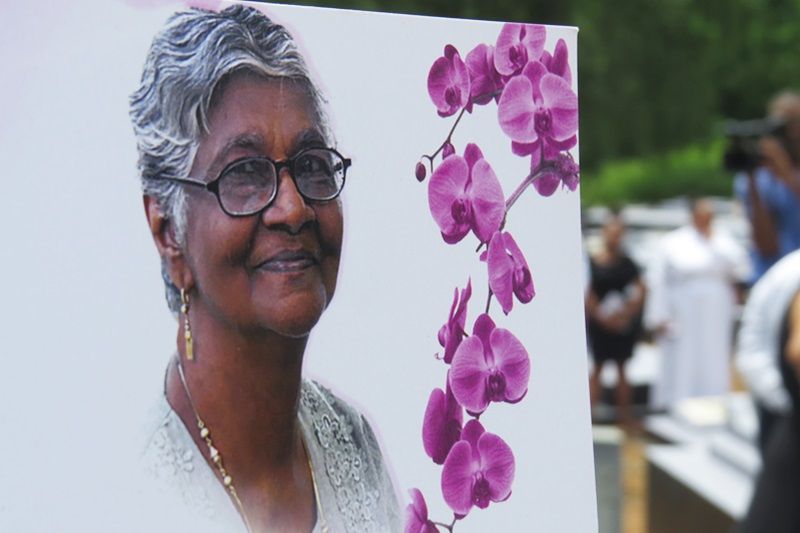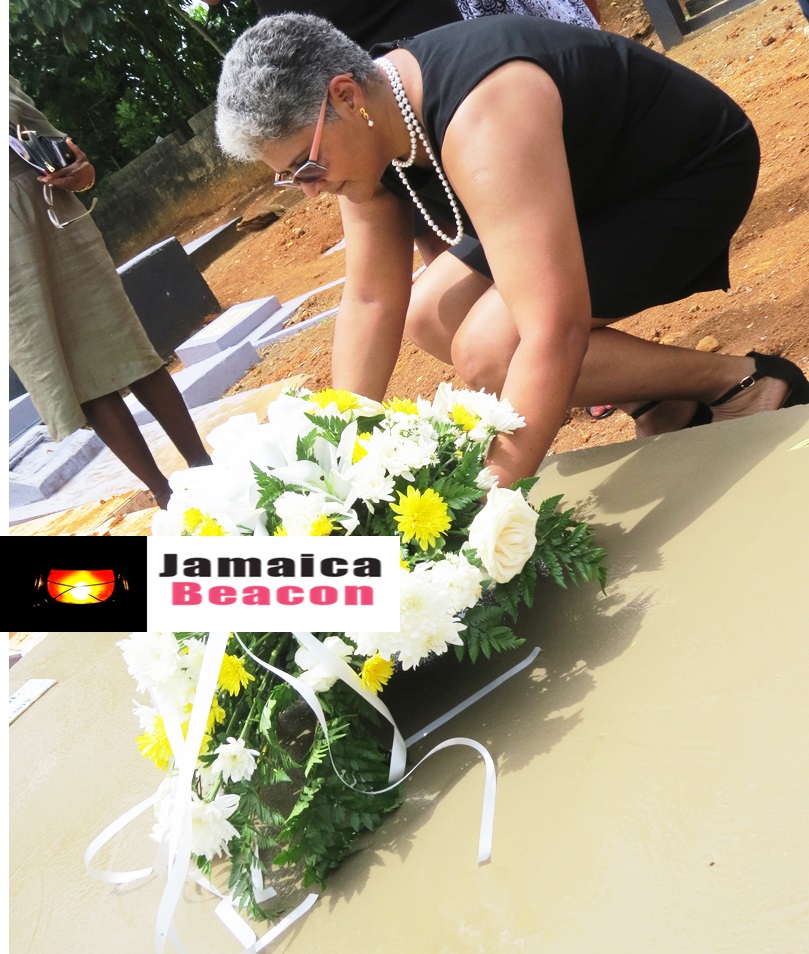The Mongol story | Mourners given unprecedented view into life of Linstead business icon
August 20, 2019An iconic business figure in her native town of Linstead, St Catherine, Louise Mongol-Gunter, 87, died of natural cause on July 31.
She was interred at Heathfield Cemetery in Linstead on Saturday afternoon, August 17, following a ceremony at St Helen’s Roman Catholic Church – near Linstead Public Hospital.
One of the late businesswoman’s daughters, Dr Paula Gunter, during the ceremony, gave persons in earshot an unprecedented view into the life of her late mother affectionately called Miss Lou.
THIS IS WHAT SHE SAID:
Distinguished guests, members of the Catholic church, friends and family: Charmaine, Elizabeth and I thank you all for being here.
The pre-service was the only part of the programme that my mother did not plan.
But her instructions were, “Don’t chat too much!” I am going to interpret that as “Don’t speak longer than you need to!”
My mother was a great storyteller and we would listen attentively when she spoke about her family, her life and experiences in general.
She never completely divulged all the details of these stories to one person or in one sitting; instead, it seemed as if it was in talking with others that the full narrative would emerge with each person saying, “You didn’t tell me that part, Lou.”
So, today, I will treat you to some of those in the hope that you will get a better understanding of her and her life.
HER PARENTS
Lou’s story begins with her parents.
Her father, Mongol, was brought to Jamaica around 1913 as a part of the British Colony Indian Indenture System to cultivate produce on any plantation that the Colonial Government assigned.
He was to work for a period of five years after which his passage to India would be arranged by the local government office.
However, at the end of his indentureship, most ships were being used in World War 1, so instead of spending his money travelling between St Mary and the shipyard in the hopes that an assigned ship would actually return to India, Mongol took the decision to settle in Jamaica.
Taking the small amount of money that the colonial office offered for his passage, and the money he saved during indentureship, and money from doing additional work on the banana trucks at nights, he stayed on the St Mary plantation for a while.
In 1920, by pre-arrangement, Mongol came to Linstead to meet his future wife – your mother, Elizabeth James (Ms Babe) who was a first generation Jamaican of Indian descent.
Not having any direct family on the plantation in St Mary, Mongol moved to Linstead.
When he tried to purchase land, only non-arable lands were sold to Indians at that time.
He settled on leasing a plot of land in Burton to cultivate and purchase a very rocky piece of land at 6 Fletchers Avenue.
While your mother was pregnant with you, a six-foot-by-eight-foot room was constructed in January 1932 (the year of your birth) at 6 Fletchers Avenue, and became first Miss Mongol shop for your mother.
You were born a few months later on April 24, 1932.
You were the fifth of Mongol and Ms Babe’s six children.
Before you were born, your father and his trucking friends had hauled topsoil from every place he worked across Jamaica to create a side garden for your mother.
There, Ms Babe would plant vegetables to supplement her family’s nutrition and would sell the excess produce to persons going to the Post Office because, in those days, everybody in Linstead and surroundings would visit the Post Office at least once per week.
At seven years old when you started Linstead Government School, you asked your father for a flowers garden.
Everybody laughed at your request.
But your father was your faithful advocate and together you and he would carry over the ground provisions and at least one small pail of topsoil from Burton to 6 Fletchers Avenue.
You continued with this activity twice per week for two years until you transformed a part of the front yard into your garden which was to be used solely for flowers.
As your garden flourished, you got help from your siblings, and even the men from Linstead Market would bring you manure from the Donkey Park section whenever you needed it.
At age 11, you developed a series of illnesses, which kept you out of school. You didn’t fall behind though, as your brother Ramsel would find out the topics discussed and teach them to you despite having his own high school work and chores to complete.
Being at home, you assisted your mother with all correspondences as neither parent had any schooling and could not read nor write.
But your mother had uncommon common sense!
She worried about your future and was determined that, should you grow up to be invalid, you would not be dependent nor be taken advantage of by anybody.
So, Ms Babe arranged for you to sew, crochet and learn all types of needlework skills from Mrs Merl Harrison.
Your crocheting skills and speed became legendary. Your mother’s plan for you was to be a dressmaker.
You recovered from your illness, but you were still physically weak when you entered Cathedral High School and completed the required five years of high school.
BUSINESS OVER NURSING
You loved school and did not want to miss a day if you could avoid it; however, you were absent sometimes due to illness or having to work in the shop at your mother’s request or demand – as children dared not disobey their parents in those days.
Your dream was to become a nurse, but you did not attend school on one crucial day during the sitting of your final school-leaving examinations.
While you graduated from Cathedral High School, you did not have the entry qualifications to become a nurse.
You were devastated and mad at your mother, the shop and the whole world.
Forever the planner, you came up with the idea that you would take a book-keeping course at Jamaica School of Commerce, work and save your money and later apply to Nursing School – possibly even going away to England.
At the end of the book-keeping course in 1951, your mother ended that dream when she told you that you would be working with her in the shop.
Your words were, “It was with tears that I joined her.”
Lou worked in that shop continuously until 2012 when she retired.
When you told me that story, I recited Langston Hughes’ poem “Harlem” which was incidentally written in 1951, and it asked the question:
“What happens to a dream deferred?
Does it dry up
like a raisin in the sun?
Or fester like a sore—
And then run?
Does it stink like rotten meat?
Or crust and sugar over—
like a syrupy sweet?
Maybe it just sags
like a heavy load.
Or does it explode?
I don’t think I got to finish the poem because you sharply said, “Rubbish! Americans dwell too much on baggage. They should look to our Paul Bogle. I just put my shoulder to the wheel and made life.” And indeed you did make a wonderful life, Ms Lou!
Just as you had the vision to see a garden in your front yard, you were always thinking one step ahead.
In the shop, you recorded items that customers were asking for and, in a way, completed statistical research to widen the shop’s offering from only dry goods to include wet foods like shad, herring and pickled meats – much to your mother’s displeasure.
When the Public Works men would gather after work on Fridays at the front of the shop, you made your younger brother, Ken, join pieces of wood to form a bench and later started a bar.
The shop was extended in short order and became Mongol’s Retail and Bar.
TRUE TO FRIENDS
You related well to people from all walks of life. You showed great empathy to all and you valued their character, discipline and commitment to hard work over pedigree and status.
You were a true and loyal friend who nurtured your friendships and relationships, and when you couldn’t or didn’t see persons for a while, you would arrange a big gathering where you would cook your famous curry goat and roti for all to enjoy.
You were always so busy – a woman of action who wished that people would stop chatting about what they could do and instead actually do something no matter how small.
You attended to many of the small things that persons overlooked but missed greatly when you retired.
You did things like offering all the mad and homeless persons in Linstead a place to shower, or arranging for them to be cleaned and given a haircut should they choose – along with new clothing at least twice per year.
You cleaned the Heathfield Cemetery for nearly 30 years; you gave a 110-pound bag of sugar and 3 bags (or 150 pounds) of cornmeal monthly for almost 40 years to the Alpha Sisters of Mercy for their soup kitchen.
Maybe one of the reasons that you packed so much life into your days was because you almost died as a young girl, and you saw your younger brother battling illness all his life.
You were always so grateful to be alive.
You loved Garvey’s message of self-actualization, and was a big fan of Bob Marley when everybody used to call him “that Rasta Boy” because you said you liked his message.
You worked on improving yourself, your family and the store.
After Ramsel – your older brother – left Linstead to work in Kingston and eventually went away to college, you had to travel to downtown Kingston to buy goods.
The first time that you went to Chas E Ramson, accompanied by Ms Merl, the two of you were the only women there.
Subsequently, you would return alone fortnightly, and the situation was always the same… the only woman!
You were a trail-blazer!
Your friend, the late Ken Philibert, always interjected that the salesmen, himself included, would always fight to see who would serve you.
You forged a friendship with him, as he was genuinely interested in helping you to succeed.
He informed you about applying to get goods on credit and other tidbits that were not publicized to small business owners.
Each trip to Kingston was informative, and Mr Philibert continued to speak with you about business from his perspective.
You would reflect on all that you heard and look around at how you could improve.
Emboldened by the pioneering transactions at Chas E Ramson, you made the daring decision to do the same at GraceKennedy & Company Limited. There, you met with the late Mr Carlton Alexander and told him why it was in his best interest to extend you a line of credit.
You left that day with getting one-month credit on goods from Grace. You were a game-changer.
CREDIT TO CUSTOMERS
Before the “pay-it-forward movement” was even formed, my mother was doing it.
From the late ’60s, I fondly remember piling into my father’s Oxford Minor with my mom, Uncle Ken and sometimes Charmaine for a Sunday outing to visit areas that my mother’s customers were from.
We visited places like Guy’s Hill, Mount Industry, Sligoville, Ginger Ridge, Point Hill, Lluidas Vale, Moneague in St Ann, Highgate in St Mary and May Pen in Clarendon and all the places in between.
After each outing, Lou would usually offer a one or two-week line of credit to a few more customers, particularly to women with children.
She would then go on and mentor these women on how to build their businesses, keep good records and manage their money.
She explained to the women that she wanted them to succeed and have more women in business and, as a by-product, if they did well, she would also do better.
Her choice of having more women on the credit list was because most had children and they wanted their children to have a good education.
PASSION FOR EDUCATION
My mother was passionate about education.
In the early years, she used the labels of the products that were in the shop to teach workers – usually boys/men who were pulled out of school early.
She taught them how to form, write and sound out letters and eventually words.
She preferred to hire new school leavers, giving them an opportunity to get some job experience in order to move on in the world of work.
It was with great joy that she worked, along with the late Father Tom, to create the St Helen’s Preparatory School and build the church hall.
For her own children, she worried about our education.
When my sister initially had challenges with reading, you sought out a loving teacher – the late Mrs Ena May Brown, who would not only teach her academically, but who would nurture her personality – and eventually mine.
You listened to me when I said I wanted to go to school at 2 ½, and you paired me with an equally loving teacher – the late Ms Ruth of the Salvation Army Basic School.
You are the only person I know of who mentioned in all your earlier wills that, in the event of your death, the executor was to ensure that all expenses related to tuition, room and board for your children must be covered up to the age of 21.
Additionally, should there be a need to pay a guardian or caregiver and the funds were not there, then your assets should be duly sold to ensure proper payment is given and all debts settled. My sister and I thank you for this commitment.
You were even more ecstatic about your only grand-daugther’s graduations.
Your attention to details and powers of observation were renown. It was honed at Cathedral High School.
Your teacher required you and your classmates to notice everything on your journey to school, and the students would be required to verbally describe all that was seen.
You loved this exercise and was proud that you didn’t have to make up anything in the mornings when it was your turn to tell the class of your observations.
I saw this quality when I worked with you in the store to modernize all the computer systems.
My tracking system determined that you only needed to buy 10 cases of peanut each week based on your selling history, but you insisted on buying 30 cases each week, starting from October.
When I asked, ‘why?’, you told me: “Peanuts come from Trinidad. When Trinidadians party for pre-carnival and carnival, they are slow to return to work and slower to ship to Jamaica … There will be a peanut shortage.”
You knew the cycles for each item that you sold in your head.
You taught all of us around you the value of listening to the voice of age and experience.
You helped to mould many salesmen and saleswomen and others that came in contact with you.
You lived life to the fullest even in the most turbulent of times in your life.
The death of your son three days after his birth, the upheaval of the ’70s, the tragic shooting death of my father in the ’80s, the financial instability of the ’90s, the recession in 2000 – yet you were a true nationalist, always standing by your beloved country.
RETIREMENT
In 2018, in reflecting on your life over ice cream, you said that you weren’t perfect and you made a lot of mistakes, but you tried to right as many things as you could where you caused hurt or pain.
You wanted to be a nurse to help people. This was the core desire, and you were able to help people by doing what you didn’t want to do initially.
By meeting the responsibilities that were required to do something that one does not like, you were able to help more persons than you would probably help had you been a nurse.
After retirement, you were still going strong until you had a bad fall.
Your health went downhill from there until you slipped away in the afternoon on July 31st, 2019.
In our grief, let us smile knowing that you are with your beloved brothers and sisters, and standing next to my father again.
Paraphrasing Dr Martin Luther King’s speech on “What Is Your Life’s Blueprint”, we can truly say that you, Louise Mongol-Gunter, adjusted your mind to what you were gonna be in life; you set out to do it as if God Almighty called you at that particular moment in history to do it.
You set out to do a good job. And you did that job so well that the living, the dead and the unborn couldn’t do it any better.
It fell your lot to be a shopkeeper, and you kept that shop like Michelangelo painted pictures; you kept that shop like Beethoven composed music; you kept that shop like Shakespeare wrote poetry.
You kept shop so well that all the hosts of Heaven and earth would pause and say: Here lived a great shopkeeper who did her job well.
Rest well, Lou Lou.




Dr Paula Gunter lays a wreath on the grave of her late mother
WE also do obituaries, advertisement, and special coverage of funerals, birthday parties, weddings, and other milestones. Call or WhatsApp us at 876-305-4574 or emaail us at jamaicabeaconnews@gmail.com.

